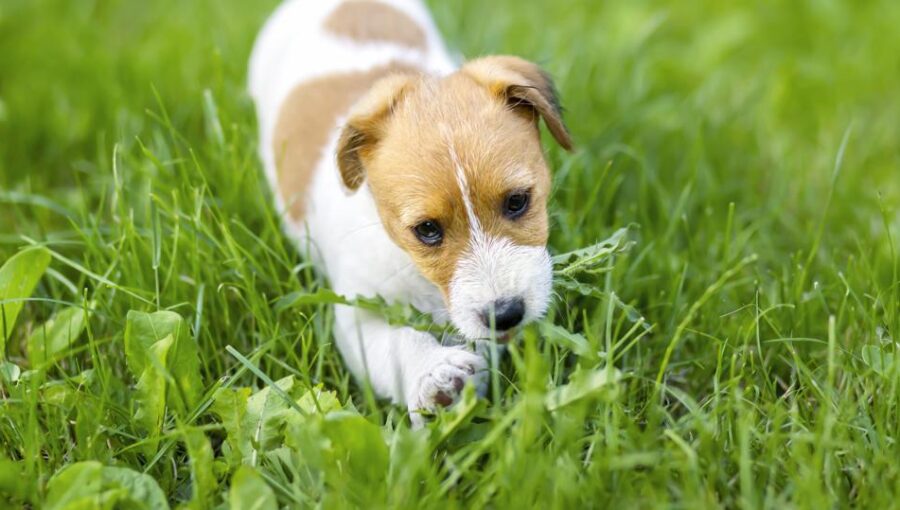If you’re a dog owner, you’ve likely witnessed your furry companion munching on blades of grass or heard their tummy rumbling like a distant thunderstorm. But why do they do this?
In this post, we’ll explore the potential reasons behind these habits and whether they should raise any red flags for pet owners.
Here are some key points we’ll cover:
- The evolutionary explanation for why dogs eat grass
- Possible causes of stomach gurgling in dogs
- Whether it’s normal for dogs to graze on grass and have stomach noises
- Tips for preventing excessive grass-eating in our canine companions
- When to seek veterinary advice if your dog displays unusual behaviors
So let’s embark on this journey together and unravel the enigma of our four-legged friends’ grass-eating tendencies.
So, Why Is My Dog’s Stomach Gurgling?
Table of Contents
- 1 So, Why Is My Dog’s Stomach Gurgling?
- 2 Understanding Dog Stomach Gurgling or Borborygmus In Dogs
- 3 Common Causes of Dog Stomach Gurgling
- 4 Symptoms Accompanying Stomach Gurgling
- 5 When to Seek Veterinary Help About Your Dog’s Stomach Gurgling
- 6 Preventing Stomach Gurgling in Dogs
- 7 Treatment Options for Dog Stomach Gurgling
- 8 Conclusion
It’s a common question and there are many possible answers. The causes range from eating too quickly to intestinal parasites, “bad bacteria,” normal gas movement through the GI tract, hunger or excessive gas ingestion, stress, and a mildly upset stomach. Understanding these causes is crucial in promoting your dog’s overall health and well-being.
| Cause | Description |
| Eating too quickly | Some dogs have a habit of gobbling up their food too quickly which can lead to excess air being swallowed, causing stomach gurgling. This issue can be remedied by using specialized slow-feed bowls or feeding smaller portions more frequently. |
| Intestinal parasites | Parasites such as roundworms, hookworms, and tapeworms can also cause stomach gurgling in dogs. Regular deworming is essential and if you suspect a parasitic infection, consult with a veterinarian immediately. |
| “Bad bacteria” | Certain types of bacteria like campylobacter, clostridia, and salmonella can cause bacterial infections in dogs, leading to stomach gurgling. Practicing proper hygiene and sanitation can help prevent these infections. |
| Normal gas movement | “Passing gas” is a normal occurrence and can also cause stomach gurgling in dogs. This may be more noticeable after strenuous exercise or panting. If excessive gas is a concern, consult with a veterinarian for further advice. |
| Hunger or excessive gas ingestion | Dogs who are hungry or ingest excess gas through panting or exercising may also experience stomach gurgling. While this is usually not a cause for concern, it is important to ensure your dog’s diet is well-balanced and they are getting enough exercise. |
| Stress | Dogs can experience stress just like humans, and this can manifest in physical symptoms like stomach gurgling. Identifying and addressing the source of stress, as well as providing proper support and training, can alleviate these symptoms. |
| Mildly upset stomach | Like humans, dogs can experience mild stomach upset due to various reasons. This can cause stomach gurgling, but typically resolves on its own. If symptoms persist or worsen, consult with a veterinarian for further guidance. |
Understanding Dog Stomach Gurgling or Borborygmus In Dogs
Dog stomach gurgling, also known as borborygmus, is a common occurrence that can be alarming for dog owners.
This rumbling sound is caused by gas moving through the gastrointestinal tract and can be a sign of an underlying issue or simply a normal and harmless event.
Potential Causes of Dog Stomach Gurgling
There are various potential causes of dog stomach gurgling, including:
- Hunger and an empty stomach
- Digesting a large meal
- Exposure to toxins such as antifreeze, pesticides, or cleaning products
- Normal gas movement through the GI tract
- Excessive gas ingestion from panting or intense exercise
- Eating too quickly and swallowing excess air
- Gas moving from one part of the intestines to another
Identifying the Cause of Dog Stomach Gurgling
While stomach gurgling is typically a normal occurrence in dogs, it’s important to monitor the frequency and severity of the gurgling. If it occurs often or is accompanied by other symptoms like vomiting, diarrhea, or loss of appetite, it could indicate an underlying issue.
To identify the cause of your dog’s stomach gurgling, consider these steps:
- Observe your dog’s behavior and appetite: Changes in behavior or appetite may suggest an underlying issue.
- Check for other symptoms: As mentioned earlier, if the gurgling is accompanied by other symptoms, it could be a sign of a more serious problem.
- Keep track of your dog’s eating habits: If your dog tends to eat quickly or swallow excess air while eating, this could be a potential cause of stomach gurgling.
- Consult with your veterinarian: If you’re unsure about the cause of your dog’s stomach gurgling or notice concerning symptoms, it’s best to seek advice from your veterinarian for an accurate diagnosis.
Prevention and Treatment of Dog Stomach Gurgling
In most cases, dog stomach gurgling is harmless, but there are steps you can take to prevent or treat it if it becomes a recurring problem.
- Feed your dog smaller meals throughout the day instead of one large meal.
- Slow down your dog’s eating by using a slow-feeder bowl or spreading out their food on a flat surface.
- Avoid giving your dog foods that are known to cause gas, such as beans or dairy products.
- Keep potentially toxic substances out of reach of your dog.
- If the gurgling is accompanied by other concerning symptoms, consult with your veterinarian for proper treatment.
Common Causes of Dog Stomach Gurgling
Dog stomach gurgling can be caused by a variety of reasons, and grass-eating may worsen the issue in some cases. Below are some of the most common causes and how they relate to a dog’s grass-eating habits.
- Anxiety or Stress: Dogs may experience anxiety or stress, leading to stomach gurgling. This is commonly seen in dogs with separation anxiety or fear of loud noises. Eating grass may serve as a coping mechanism for these dogs, providing a distraction and calming their nerves.
- Sudden Change in Diet: A sudden change in diet can also trigger stomach gurgling in dogs. If a dog is not used to consuming grass, their stomach may react negatively, causing gurgling. Moreover, if a dog suddenly starts eating more grass than usual, it can disrupt their digestive system and result in gurgling.
- Food Intolerance or Allergies: Dogs, like humans, can have food intolerances or allergies that lead to stomach gurgling. If a dog is intolerant or allergic to something in their food, it can cause digestive issues and gurgling. In some cases, dogs may eat grass to ease their upset stomach caused by these problems.
- Eating Too Quickly: Dogs that consume their food too quickly may experience stomach gurgling. This is because they take in excess air while eating, causing gas to move through their digestive system and result in gurgling. Eating grass may also contribute to this problem as dogs tend to eat grass rapidly, further aggravating their stomach discomfort.
- Soothing an Upset Stomach: Dogs may eat grass as a way to soothe an upset stomach. The rough texture of the grass can help flush out any undigested food or irritants from their stomach, providing relief from gurgling.
Symptoms Accompanying Stomach Gurgling
Your furry companion may exhibit a variety of symptoms alongside stomach gurgling, including excessive grass consumption, loss of interest in food, changes in behavior, and signs of discomfort. These telltale signs can be observed by closely monitoring your dog’s diet, bowel movements, and actions, as well as the frequency and intensity of gurgling noises. It is crucial to keep a close eye on these symptoms and consult with your veterinarian if they persist or worsen.
In some cases, stomach gurgling can be a sign of an underlying issue that your dog may be experiencing. This could be something internal, such as pain or fear, or external, like an unfamiliar animal outside. However, it is essential to note that such instances are rare and should not be overlooked. It is still vital to identify the root cause of the gurgling sounds.
Similar to how our furry friends have unique personalities, their digestive systems can also vary. Some dogs may experience stomach gurgling more frequently than others, while some may only encounter it on occasion. Therefore, it is essential to familiarize yourself with your dog’s normal bowel movements and eating habits to better understand when something is amiss.
Furthermore, if you notice any additional symptoms accompanying stomach gurgling, such as diarrhea or vomiting, it is crucial to seek veterinary advice immediately.
While occasional gurgling may not be a cause for alarm, persistent or worsening symptoms could indicate a more significant underlying issue that requires immediate attention.
When to Seek Veterinary Help About Your Dog’s Stomach Gurgling
Your canine’s tummy churning can be a natural part of digestion, but it’s crucial to take note of any accompanying indications that may reveal an underlying problem.
If your dog is vomiting, experiencing diarrhea, lack of appetite, drooling, regurgitation, lethargy, or weight loss (in chronic cases), then it’s best to proactively seek veterinary assistance.
It’s always better to err on the side of caution and consult with your veterinarian if you have any doubts or concerns about your dog’s stomach churning.
Understanding the Digestive System in Dogs:
Dogs have a unique digestive system specifically designed to process and break down their food.
As part of this process, stomach churning or borborygmi can occur. This is caused by gas and fluid moving through the intestines and is usually nothing to worry about.
In fact, it’s a sign that your dog’s digestive system is functioning properly.
Identifying Potential Digestive Issues:
While stomach churning is typically normal, it can also be an indication of underlying digestive issues. If your dog’s churning sounds are excessive or accompanied by other symptoms, it may signify a problem with their digestive system.
This can include issues such as food allergies, intestinal blockages, pancreatitis, or inflammatory bowel disease. It’s vital to pay attention to any changes in your dog’s churning sounds and behavior.
When to Consult a Veterinarian:
If your dog is experiencing any of the following symptoms along with stomach churning, it’s best to seek veterinary help immediately:
- Vomiting
- Diarrhea
- Lack of appetite
- Drooling
- Regurgitation
- Lethargy
- Weight loss (in chronic cases)
These symptoms can be indications of a more serious issue that requires immediate attention.
It’s always better to consult with your veterinarian if you have any concerns about your dog’s health.
Tips for Monitoring Your Dog’s Stomach Churning:

To keep track of your dog’s stomach churning, it’s important to pay attention to their diet, behavior, and any changes in churning sounds. Keep a food diary and monitor if there are any triggers or patterns that may be causing excessive churning.
Also, observe your dog’s behavior and look for any signs of discomfort, such as pacing or whining. If you notice any changes or worsening of symptoms, consult with your veterinarian immediately.
Preventing Stomach Gurgling in Dogs
Stomach gurgling in dogs is a common occurrence that can be attributed to various factors, including intestinal parasites, foreign objects, inflammatory bowel disease, and pancreatitis. To ensure the well-being of your furry companion, it is essential to take preventive measures and properly manage these underlying causes.
Intestinal parasites are one of the most frequent culprits of stomach gurgling in dogs. These pesky organisms can be prevented by regularly administering prescribed de-worming medications. Additionally, foreign objects, such as toys or bones, can also cause stomach gurgling and may require surgical removal to prevent further complications.
Another potential cause of stomach gurgling in dogs is inflammatory bowel disease (IBD). This condition requires careful management through dietary changes, immune-suppressants, corticosteroids, and antibiotics. It is crucial to work closely with your veterinarian to determine the most effective treatment plan for your dog’s specific case of IBD.
Pancreatitis is a more serious cause of stomach gurgling in dogs, which can be life-threatening if left untreated. If you suspect your dog may have pancreatitis, it is vital to seek immediate veterinary care. Treatment typically involves antibiotics, fluid therapy, and supportive care.
In addition to these specific causes, there are also general preventive measures that can help reduce stomach gurgling in dogs. These include feeding a balanced diet, avoiding table scraps or sudden dietary changes, and ensuring your dog has access to clean water at all times.
Overall, it is crucial to pay close attention to any changes in your dog’s behavior or symptoms associated with stomach gurgling. If you notice any concerning signs, it is best to consult with your veterinarian for proper diagnosis and treatment.
Treatment Options for Dog Stomach Gurgling
There are plenty of effective ways to treat your dog’s stomach gurgling, such as:
- Not feeding them
- Giving them a simple meal
- Providing them with pumpkin puree
- Administering appropriate medication.
| Option | Description | Effectiveness |
| Not feeding them | This involves withholding food from your dog for a certain period of time, usually 12-24 hours. This allows their stomach to take a break and can help minimize the gurgling noises. | Highly effective |
| Simple meal | A simple meal of boiled chicken and rice is gentle on the stomach and can ease the symptoms. | Highly effective |
| Pumpkin puree | Pumpkin is a natural source of fiber and can regulate digestion, reducing stomach gurgling. | Moderately effective |
| Medication | If the stomach gurgling is caused by an underlying health issue, like pancreatitis or inflammatory bowel disease, your vet may prescribe anti-vomiting medication, antibiotics, or dog-specific antacids. | Highly effective depending on the cause |
| Professional veterinary advice | If your dog’s symptoms persist or worsen, it is crucial to seek expert veterinary guidance instead of solely relying on home remedies. | Highly effective |
Conclusion
In conclusion, the mysterious behavior of dogs eating grass and experiencing stomach gurgling has piqued the interest of many dog owners. Through this blog post, we have delved into the possible reasons behind these habits and whether they should be a cause for concern.
From an evolutionary perspective to potential triggers and prevention tips, we have unraveled the enigma of our four-legged companions’ grass-eating tendencies.
While stomach gurgling is a common occurrence in dogs, it is crucial to keep a close eye on their behavior and consult with a veterinarian if any alarming symptoms arise.
By understanding the underlying causes of stomach gurgling and its connection to grass consumption, we can promote our furry friends’ overall health and well-being.
Remember to monitor your dog’s diet, pay attention to their eating patterns, and seek professional advice if needed.
Let’s continue to shower our beloved pets with love and care by staying informed about their unique behaviors and providing them with proper support when necessary.






